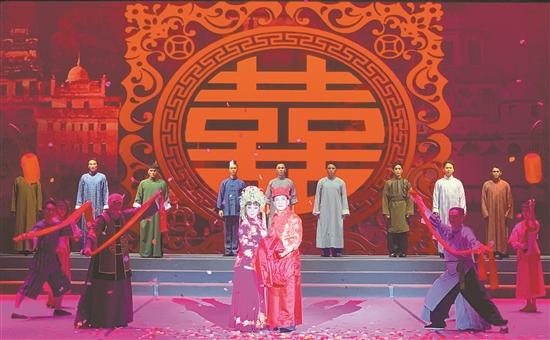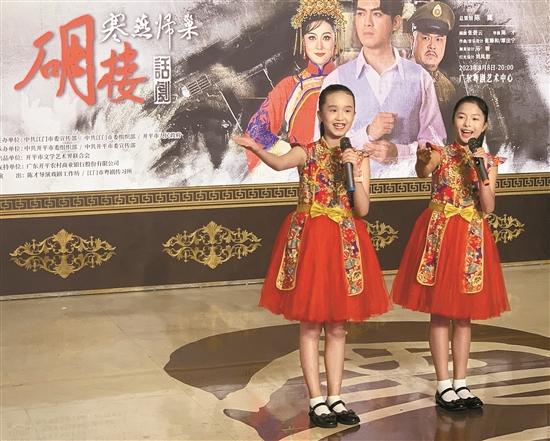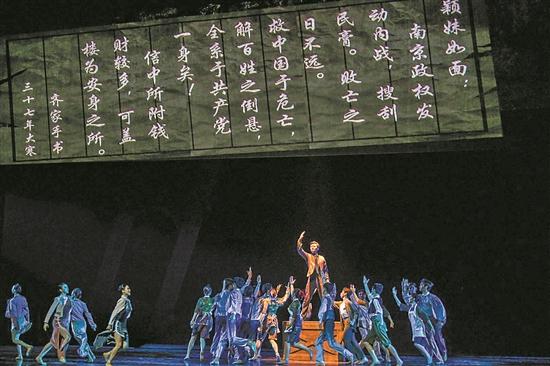
For generations, traditional Chinese opera, including Cantonese opera, has been deeply cherished by the people of the Wuyi region. Amid the rich theatrical atmosphere, Jiangmen has given birth to iconic performers such as the renowned Hung Sin-nui (Hongxian Nv) performed by Kuang Jianlian.
This year, several remarkable musical and dramatic productions, imbued with the distinct flavor of the Wuyi region, are taking the stage to depict the unique cultural essence of the "Hometown of Overseas Chinese."

As firecrackers resound and families celebrate the New Year, fathers travel to seek their fortune in the"Gold Mountain", amassing wealth in gold and silver to build homes and acquire land upon their return. Folk songs set the stage as curtains rise, vividly portraying the life in the Overseas Chinese community in Jiangmen. This opening scene is from the original qiaopi-themed dance drama "Qiaopi · Homeland," recently performed.

Starting from the Ming Dynasty, the Wuyi region saw the emergence of oratorio, composed and sung in local dialects. As subsequent generations inherited and refined this tradition, unique folk songs were born. The folk song from the opening scene of "Qiaopi · Homeland" is a children's rhyme popular in the Jiangmen and Taishan areas.
The music of Kaiping folk songs is known for its lively tunes and simple yet beautiful melodies. Folk songcreators ingeniously integrated various musical styles and elements into these songs, incorporating them into opera and dance performances.
Jiangmen has a rich history and a strong foundation in traditional Chinese opera, especially Cantonese opera. In this vibrant theatrical ambiance, Jiangmen has produced numerous artistic luminaries in Cantonese opera, such as Kuang Xinhua, the first head from Kaiping of the Chinese Artists Association of Hong Kong, hailed as the "Founder of Cantonese Opera", and Yim Fun Fong, the innovator of "Fong style Cantonese opera" and Kuang Jianlian, the innovator of"Hung-tone style of singing", among others.
In recent years, Jiangmen has been producing high-quality stage art with themes revolving around watchtowers and Qiaopi (letters from overseas Chinese). The dramas include" Qiaopi · China", "Qiaopi · Homeland", and "Watchtower".

Qiaopi (letters from overseas Chinese) is a postal medium that combines letters and remittance orders, often referred to as the "Dunhuang Manuscripts of Lingnan." It is a UNESCO Memory of the World document. Of the 160,000 qiaopi letters included in the UNESCO Memory of the World registry, nearly 50,000 are from Jiangmen. The earliest surviving qiaopi documents also hail from Jiangmen. The recent performance of the original dance drama "Qiaopi · Homeland" perfectly embodies the local cultivation of artistic excellence.
The chief director of the dance drama, Wang Hong, believes that "this production combines the regional characteristics, folk customs, and cultural symbols of Jiangmen." Chen Ya, the Deputy Dean of the School of Humanities and Education at Jiangmen Vocational and Technical College and the Music Director of"Qiaopi · Homeland," stated that, after refinement and enhancement, the performance incorporates more Jiangmen folk tunes and utilizes a wide range of ethnic musical instruments like bamboo flutes and the gaohu, accentuating the unique culture of the Overseas Chinese community.
戏剧精品演绎“侨都”神韵
一直以来,粤剧等传统戏剧在五邑大地深受群众喜爱,在浓厚的戏剧氛围之下,江门诞生了红线女等“名角”。
今年,多部具有浓郁五邑“侨”味的歌舞剧、诵读剧作品上演,用舞台艺术演绎独特的“侨都”神韵。
“炮仗响,贺新年,阿爸去金山赚钱,赚得金银成万两,返来起屋又买田。”民歌响起,舞台上帷幕拉开,江门侨乡生活“画卷”生动展现。这是日前公演的江门原创侨批题材舞剧《侨批·家国》开场一幕。
从明朝开始,五邑各地流行用方言创作和演唱的清唱体。随着后人继承和优化,形成了独特民歌。《侨批·家国》开场一幕的民歌,便是流行于江门开平、台山一带的童谣。
据介绍,开平民歌曲调明快,旋律简朴优美。民歌作者还把多个歌种综合运用,融入戏剧、舞蹈等艺术元素,编成歌剧演出。
江门是中国曲艺之乡,粤剧在江门有着悠久的历史和深厚的群众基础。在浓厚的戏曲氛围下,江门诞生了大批粤剧艺术名家,如祖籍开平的首任八和会馆会首、被誉为“粤班开山鼻祖”的邝新华,独创“芳腔”的恩平籍名伶芳艳芬,独创“红腔”开平籍著名粤剧艺术大师红线女等。
近年来,江门以碉楼、侨批为主题打造如《侨批·中国》《侨批·家国》《碉楼》等舞台艺术精品。侨批是一种信件、汇款单合一的邮政传递载体,被誉为“岭南敦煌文书”,是世界记忆遗产。在申报世界记忆遗产名录的16万件侨批中,江门侨批文献有近5万件,现存最早的侨批也出自江门。
近日公演的江门原创侨批题材舞剧《侨批·家国》是江门本土化培育艺术精品的完美体现。该舞剧总导演王宏认为:“这次舞剧结合江门的地域特色、民俗特色、文化符号。”江门职业技术学院人文教育学院副院长、《侨批·家国》音乐总监陈娅表示,经过打磨提升后,《侨批·家国》融入了更多江门民间小调,运用了竹笛、高胡等大量民族乐器,更加凸显侨乡特色。
文|记者 陈卓栋 彭纪宁 江轩 谭耀广
翻译|刘佳慧
责编 | 王瑜瑛
校对 | 周勇
-
Low-carbon becomes a trend at the Canton Fair
2023-10-27 00:17:15 -
Big cultural exhibition interprets 'The West Chamber' for lovers in the world
2023-10-26 00:03:47 -
2023 Hugo Award winner Hai Ya: Defining "science fiction" with a more inclusive mind
2023-10-26 00:03:58 -
Canton Fair boosts cross-border e-commerce expansion into overseas markets
2023-10-26 00:04:15






